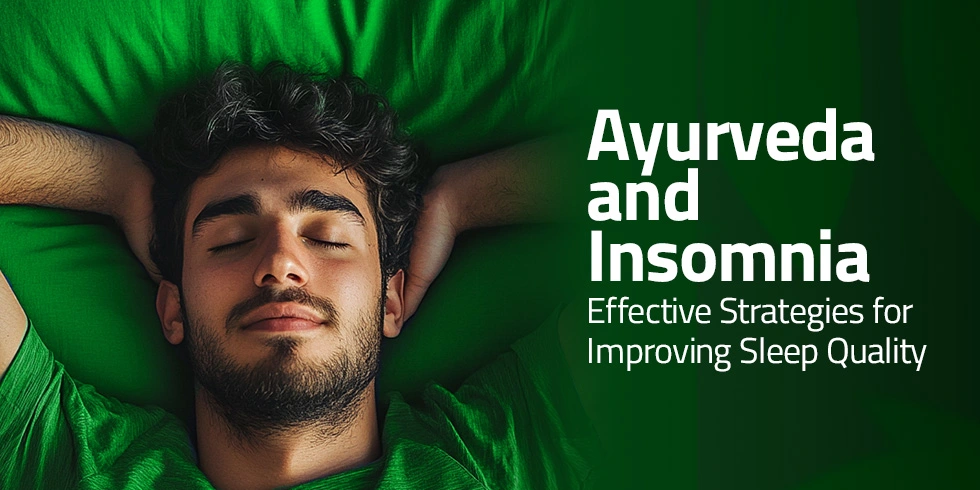Do you ever lie in bed at night, wide awake, staring at the ceiling, unable to drift off? You’re not alone. Millions of people around the world struggle with insomnia, a condition that leaves them tossing and turning, longing for rest. In today’s fast-paced world, stress, screen time, and irregular routines can all make a good night’s sleep feel out of reach. But what if there was a natural way to reclaim peaceful sleep?
Ayurveda, the ancient system of medicine from India, offers time-tested solutions to improve sleep quality. In this article, we’ll explore insomnia, its causes, and how Ayurvedic treatment for insomnia can help.
Ayurvedic View on Sleep and Doshas
Ayurveda believes that sleep is one of the three pillars of life, alongside food and energy. It considers sleep so important that it directly affects both physical and mental well-being. According to Ayurveda, insomnia is primarily linked to an imbalance in the body’s doshas—Vata, Pitta, and Kapha—which are energies that govern bodily functions.
Vata dosha, associated with movement and air, is often the culprit behind sleep disturbances. When Vata is imbalanced, it can lead to overactivity of the mind, causing racing thoughts and anxiety, which in turn makes it difficult to fall asleep. Pitta dosha, linked to fire and heat, can also cause insomnia, especially if it is associated with irritability or waking up in the middle of the night feeling hot or restless. Conversely, Kapha is connected to stability and calm, and when in balance, it promotes deep, restful sleep.
Recommended Ayurvedic Practices and Herbs
Ayurvedic treatment for insomnia focuses on balancing the doshas, calming the mind, and creating a soothing environment that promotes natural sleep. Here are some Ayurvedic practices and herbs that can help improve sleep quality:
1. Abhyanga (Oil Massage)
Abhyanga is the practice of massaging the body with warm, herbal oils. This process helps calm the nervous system and reduce Vata imbalance. Massaging the scalp and feet before bed with sesame or Brahmi oil can help relax the body and prepare it for sleep.
2. Herbs for Insomnia
Ayurvedic herbs have long been used to promote restful sleep. Some of the most effective herbs include:
- Ashwagandha: Known for its stress-relieving properties, Ashwagandha helps calm the mind and body, making it easier to fall asleep.
- Brahmi: This herb is especially good for reducing mental strain and anxiety, which can interfere with sleep.
- Jatamansi: With its cooling properties, Jatamansi helps calm the nervous system and induces deep sleep, making it ideal for people with Pitta imbalances.
- Shankhapushpi: Known to support cognitive function, Shankhapushpi also has a calming effect, making it helpful for managing insomnia due to mental stress.
These herbs can be taken as powders, tablets, or teas, but an Ayurvedic practitioner should determine the right dosage.
3. Shirodhara
Shirodhara involves pouring a continuous stream of warm oil onto the forehead, directly onto the “third eye” area. This deeply relaxing therapy helps balance the Vata and Pitta doshas and is particularly effective for sleep disorders caused by stress or anxiety.
Lifestyle Adjustments for Better Sleep
Along with Ayurvedic remedies, simple lifestyle changes can greatly improve sleep quality. Ayurveda teaches that a balanced lifestyle is essential for good health, and this also extends to sleep.
1. Establish a Regular Sleep Routine
Our bodies thrive on routine. Going to bed and waking up at the same time daily helps regulate your body’s internal clock, also known as the circadian rhythm. Aim to go to bed before 10 PM, which aligns with Kapha’s energy and promotes restful sleep.
2. Limit Screen Time
The blue light emitted from phones, computers, and TVs can disrupt melatonin production, the hormone responsible for sleep. Try to avoid screens at least an hour before bedtime. Instead, engage in calming activities such as reading or meditation to help unwind.
3. Eat a Light, Early Dinner
In Ayurveda, it is recommended that you eat your evening meal by 7 PM to make it light. Heavy or spicy meals too close to bedtime can disrupt digestion and disturb sleep. Opt for easily digestible foods, and if needed, drink warm milk with a pinch of nutmeg before bed, a natural sleep inducer.
4. Practice Meditation or Pranayama
Breathing exercises and meditation can help calm the mind and body before sleep. Simple practices such as Nadi Shodhana (alternate nostril breathing) or Shavasana (corpse pose) can help relieve stress, ease anxiety, and prepare the body for a restful night.
The Role of Diet in Promoting Sleep
Ayurveda emphasizes diet as a vital aspect of maintaining health and balance in the body. What you eat can either promote restful sleep or cause disturbances. In Ayurvedic terms, food is classified according to its impact on the doshas. Certain foods can increase Vata and Pitta, leading to imbalances that disturb sleep, while others calm the doshas, helping the body relax and promoting better sleep.
1. Warm, Nourishing Foods
To balance Vata and Pitta, Ayurveda recommends eating warm, cooked, and mildly spiced foods. Soups, stews, and porridge are great dinner options because they are light, easy to digest, and comforting. Adding spices like cumin, turmeric, and coriander can further aid digestion and calm the mind.
2. Avoid Caffeine and Sugary Foods
Caffeine, found in coffee, tea, and chocolate, stimulates the nervous system and can make it harder to fall asleep, especially when consumed late afternoon or evening. Similarly, sugary foods can cause fluctuations in blood sugar, leading to energy spikes that interfere with your ability to relax before bed.
3. Include Sleep-Inducing Foods
Certain foods can naturally support the body’s sleep cycle. Ayurveda suggests consuming small amounts of foods like almonds, warm milk, and bananas, all containing natural compounds like magnesium and tryptophan that help promote relaxation and sleep.
Including these sleep-inducing foods in your diet, especially during dinner, can significantly improve your sleep quality.
Conclusion
Getting good sleep doesn’t have to be a distant dream. Through Ayurvedic treatment for insomnia, you can restore balance in your body and mind, allowing natural, restful sleep to return. From calming herbs and oil massages to simple lifestyle changes like a consistent routine and meditation, Ayurveda offers a holistic approach to tackling insomnia.
If you’re struggling with insomnia, consider visiting the Manovigyan Department at your local Ayurvedic center, where experts can provide personalized treatment to help you achieve peaceful, rejuvenating sleep.
Sleep is essential for a healthy life, and with the right approach, you can once again enjoy its full benefits.





